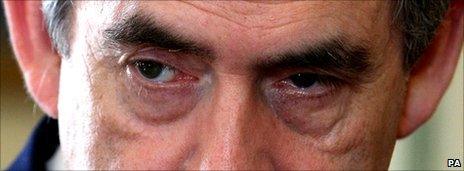The inside story of life in Brown's Downing Street
- Published

"Let the work of change begin." These were the words Gordon Brown proclaimed as he entered Downing Street for the first time as prime minister in June 2007.
He promised "a new government with new priorities" - a pledge which seemed odd to some, given he had himself been the second most powerful person in the previous administration for over a decade.
But soon after he took over, the country faced the threats of terrorism, flooding and foot-and-mouth, shortly followed by the collapse of Northern Rock. Brown dealt with them with apparent calmness and authority, boosting his popularity so much that he thought about calling a snap election.
But he didn't call that election, and his focus in his first few months ended up being on tackling immediate crises.
As a result he never really set out the programme of change that he intended to bring in.
"It was frustrating that he didn't," says Mr Brown's closest confidant Ed Balls who says he frequently urged the new prime minister to "remake that case for modern social justice".
"The basic problem was that much of Gordon's agenda had been defined in opposition to Blair's," says Nick Pearce, who became head of Mr Brown's Downing Street policy unit.
"What it didn't equip him with was a sort of master narrative. Though there was detail in some areas, it didn't carry through into an agenda that his ministers could work to."
Shouting matches
Once things started to go wrong and Labour's popularity dropped, Downing Street became a difficult working environment.
"It was an incredibly unhappy place to be", according to Mr Brown's pollster, Deborah Mattinson. "Almost everybody in it was incredibly unhappy, and I think ultimately Gordon has to take responsibility for that, for the fact that he didn't sort it out."
"There was a year which was frankly awful," says Nick Pearce. "Staff morale was not high and it was not the sort of functioning operation that you would want."
A policy adviser and a minister recall the shouting matches that they had with the prime minister when they said things that displeased him.
And in the view of an ex-civil servant who previously worked for Tony Blair, Steve Morris, "people seemed quite intimidated by [Mr Brown] and were very, very slow to contradict him".
"He has a slightly menacing demeanour at times and he's a very big and quite brooding presence, and I think it's quite easy to be quite physically intimidated."
But Brown has his defenders. "Gordon would shout and be exasperated and angry about things, but it was always for the right reasons," says his Director of Strategy, David Muir.
"His boss is the British public and he's got to be demanding of his team, and if that meant he lost his temper, sometimes he lost his temper."
Delays and frustration
The way Mr Brown's office operated caused much frustration. "Decisions were not made early enough and quickly enough," says the former Work and Pensions Secretary Peter Hain.
"The decisions piled up in or out of red boxes around Number 10, and you could not easily get a quick decision unless it was right at the top of the agenda.
"Too many decisions had to be left in the pending tray for too long, and it was a constant source of frustration to all involved in government, both cabinet ministers and officials."
The former Justice Secretary Jack Straw says "I did talk to Gordon about it and he finally got the message."
But when Mr Brown tried to rectify failings and appoint a non-political businessman Stephen Carter as his chief of staff, bitter internal disputes went from bad to worse.
"You just heard every day of blood on the walls," according to the former Health Secretary Alan Johnson. "No one could be around in politics in a senior position and not know that there were big problems over at Number 10."
Treasury 'plots'
Many of the disputes were with the Treasury with which Mr Brown became "completely obsessed" according to Lord Mandelson
"He came to a very clear view that the Treasury somehow were not on his side, that the Treasury was not being controlled adequately by the chancellor.
"He developed a sense that the Treasury were a conspiracy, that they were constantly plotting to undermine the economic stimulus, the fightback, what we were doing to save businesses and jobs and people's homes."
Lord Mandelson says he played down the disputes in his memoirs. "I couldn't possibly have described and repeated the things he said about the Treasury."
Economic crisis
But Mr Brown's handling of the international economic crisis has won praise including from his former Business Minister Baroness Vadera. She worked with him on the bank rescue plans and the G20 London summit in April 2009.
He was uniquely able to use the world stage to tackle the threat of a global depression she maintains. Even on holiday his thoughts were about the global crisis she recalls. She visited him on his 2008 summer holiday in the Suffolk seaside town of Southwold, to find that to relax he was reading a thesis on quantitative easing and works on the Japanese banking crisis.
Mr Brown's inability, or reluctance, to switch off can be seen as both a strength and a weakness.
* Martin Rosenbaum is the producer of The Brown Years, which begins at 9.00 am on Tuesday, 21 September 2010, on BBC Radio 4.